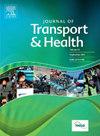Beyond the Buzz: Electric cars and the German health public budget
IF 3.3
3区 工程技术
Q2 PUBLIC, ENVIRONMENTAL & OCCUPATIONAL HEALTH
引用次数: 0
Abstract
Introduction
This study explores the impact of electric cars on public health expenditures by considering several scenarios and using the Generalized Structural Equation Model (GSEM) estimator.
Methods
The analysis utilizes a dataset covering 16 Federal States of Germany from 2008 to 2021.
Setting and population
The dataset includes data on electric car adoption, public health expenditures, road infrastructure, and socio-economic and demographic indicators.
Results
The main findings suggest that the relationship between electric cars and public health expenditures in Germany is complex, shaped by various socio-economic factors. The positive impact of electric cars on public health expenditures is mainly driven by traffic collisions from state roads that require more hospital units, including additional beds. In contrast, traffic collisions from county roads show a stronger negative correlation with hospital bed demand, indicating less pressure on the public health budget due to a reduced need for new hospital units.
Conclusions
In summary, the electric cars may increase traffic collisions in Germany, particularly on state and county roads. In this context, traffic collisions on state roads appear to result in greater demand for new hospitals with additional beds and potentially rising healthcare costs, especially considering the severity of accidents on these roads. However, traffic collisions from county roads show a negative correlation with hospital beds, being higher in amplitude than those on state roads. This indicates that local traffic characteristics, the improved safety of electric cars, and efficiencies in healthcare (e.g., outpatient care) contribute to a reduction in the need for hospitalisation and help mitigate the financial impact. Additionally, healthcare spending is influenced by factors such as unemployment, GDP growth, an ageing population, and the number of doctors. However, the healthcare system's capacity to efficiently manage hospital resources and transition to outpatient care could mitigate the financial strain caused by traffic incidents related to electric cars.
喧嚣之外:电动汽车和德国卫生公共预算
本研究通过考虑几种情况并使用广义结构方程模型(GSEM)估计器来探讨电动汽车对公共卫生支出的影响。方法利用2008年至2021年德国16个联邦州的数据集进行分析。环境和人口数据集包括电动汽车采用、公共卫生支出、道路基础设施以及社会经济和人口指标的数据。结果主要研究结果表明,电动汽车与德国公共卫生支出之间的关系是复杂的,受到各种社会经济因素的影响。电动汽车对公共卫生支出的积极影响主要是由于来自国家道路的交通碰撞,需要更多的医院单位,包括额外的病床。相比之下,来自县道的交通碰撞与医院床位需求呈更强的负相关,表明由于对新医院单位的需求减少,公共卫生预算的压力较小。综上所述,电动汽车可能会增加德国的交通碰撞,特别是在州和县道路上。在这种情况下,国家道路上的交通碰撞似乎导致对拥有更多床位的新医院的更大需求和潜在的医疗保健费用上升,特别是考虑到这些道路上事故的严重性。然而,县道交通碰撞与医院床位呈负相关,其振幅高于国道交通碰撞。这表明,当地的交通特点、电动汽车安全性的提高以及医疗保健(例如门诊护理)的效率有助于减少住院需求,并有助于减轻财政影响。此外,医疗保健支出受到失业、GDP增长、人口老龄化和医生数量等因素的影响。然而,医疗保健系统有效管理医院资源和向门诊医疗过渡的能力,可以减轻与电动汽车相关的交通事故造成的财政压力。
本文章由计算机程序翻译,如有差异,请以英文原文为准。
求助全文
约1分钟内获得全文
求助全文

 求助内容:
求助内容: 应助结果提醒方式:
应助结果提醒方式:


